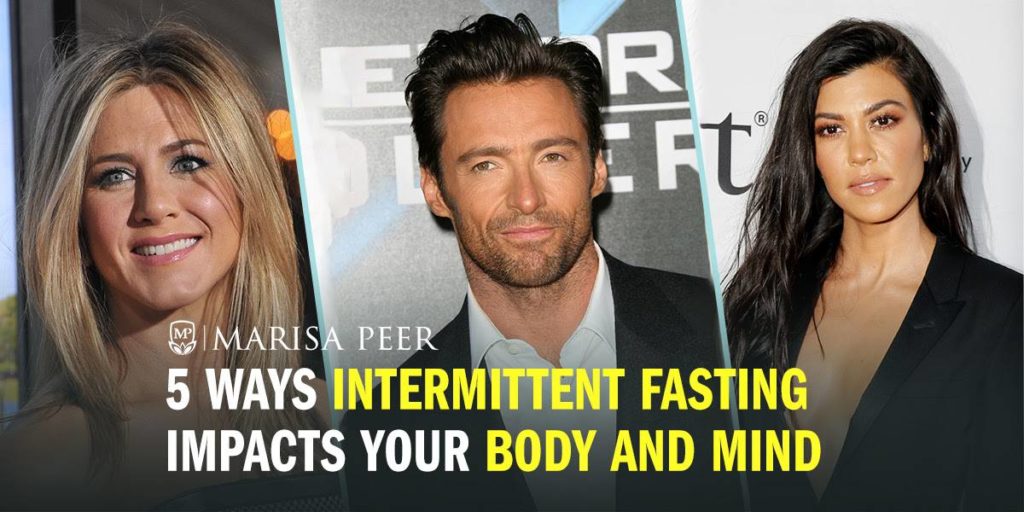“I do intermittent fasting, so no food in the morning… I noticed a big difference.” – Jennifer Aniston.
Jennifer Aniston, Hugh Jackman and Kourtney Kardashian, are some of the many celebrities raving about intermittent fasting.
In addition to being heralded as a fast way to burn fat, lose weight and improve health, science is showing that fasting intermittently could also dramatically help reduce the risks of chronic diseases including cancer, Alzheimer’s, and diabetes. Could this really be true?
This article examines the facts to find out more about…
- What is intermittent fasting?
- What are the benefits of intermittent fasting?
- What happens when you do intermittent fasting?
- How to do intermittent fasting – What are the best ways to fast?
- How much weight can you lose in a month with intermittent fasting?
+Bonus: What is the best way of achieving your perfect weight?++ FREE MASTERCLASS: Health and Weight
What is intermittent fasting?
Intermittent Fasting (IF) is a pattern of eating and scheduling meals so that you do not eat for specific periods of time. It does not specify WHAT you eat, just WHEN you eat.
Interestingly, Intermittent fasting was Google’s top trending search term for 2019. However, it’s not just another weight loss fad diet. Whilst intermittent fasting has become increasingly popular in recent times, it’s nothing new…
The ancient secret to health?
Back when your ancient ancestors were cavemen, they would have naturally been doing something similar to intermittent fasting. When the hunter-gatherers came home with food, everyone would feast – and in between, sometimes for prolonged periods – they would fast. It is how our human species evolved.

Fasting is an ancient practice that has been used for healing and health for thousands of years. Millions of people all over the world fast religiously and it is used by many cultures to connect body and mind with spirit and higher powers.
Scientientists, doctors, nutritionists, plus numerous health and wellbeing experts are all supporting this method of eating and the benefits it can bring, which we shall explore further.
What are the benefits of intermittent fasting?
- Fat burning
- Weight loss
- Improved immune system
- Increased energy
- Improved mental clarity and concentration
- Regulates blood pressure
- Reduces bad cholesterol levels
- Lowers risks of heart disease
- Lowered blood sugar and insulin levels
- Potential treatment or even reversal of type 2 diabetes
- Cellular repair, which may provide protection against several diseases
- Reduces oxidative stress and inflammation in the body
- Anti-aging benefits
- May prevent cancer and reduce the side effects of cancer
These are all benefits that have been claimed from enthusiasts of intermittent fasting. Let’s explore the science behind some of these claims to better understand how intermittent fasting impacts your body and mind.
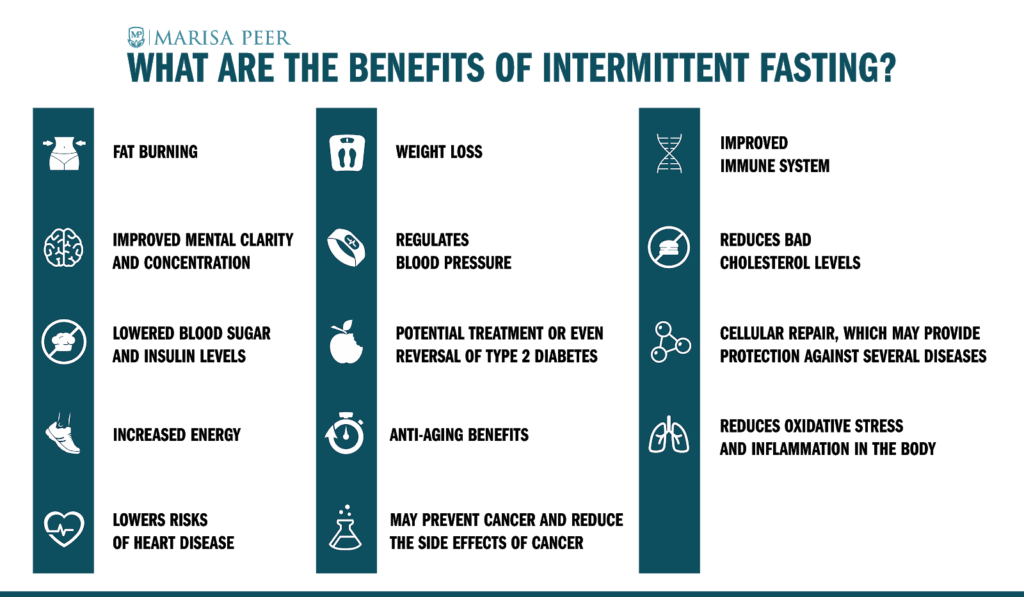
What happens when you do intermittent fasting?
Digestion is one of the highest energy-consuming tasks your body does. When your body is busy digesting, it is not repairing or replacing damaged cells or fighting off illness or disease. Your body’s rejuvenation is put on hold until it digests everything you eat.
Weight loss and fat burning
When our body is busy digesting, it is also not burning fat as efficiently as it could. This is because when your body is fasting it goes into the fat-burning mode to provide a source of energy.
This is also the cleanest, most efficient and healthiest form of energy production from a cellular level, supporting healthy mitochondria – which are like the energy batteries within your cells.
Chronic Fatigue and energy production
It is thought that people who suffer with Chronic Fatigue may have poor mitochondria function or even mitochondria failure, as their bodies cannot produce energy correctly from a cellular level. Fasting could be one way to kill off unhealthy cells and replace them with new healthy cells, which happens when we fast.
This is why intermittent fasting can not only help you lose weight, burn belly fat and keep muscle (unlike other diets), but it can also give you more energy and lead to better health.
Prevention of chronic diseases including Cancer and Alzheimer’s
The process of cleaning out damaged cells for the regeneration of new healthier cells is called autophagy. “Auto” means self and “phagy” means eat, so the literal translation of autophagy relates to “self-eating” as a means of removing waste materials.
It is believed that increased autophagy not only improves health from a cellular level, it can provide protection against several diseases, including cancer and Alzheimer’s disease.
According to Healthline’s Evidence-Based Health Benefits of Intermittent Fasting, ‘Although human studies are needed, promising evidence from animal studies indicates that intermittent fasting may help prevent cancer. There is also some evidence on human cancer patients, showing that fasting reduced various side effects of chemotherapy…
A study in rats shows that intermittent fasting may delay the onset of Alzheimer’s disease or reduce its severity. In a series of case reports, a lifestyle intervention that included daily short-term fasts was able to significantly improve Alzheimer’s symptoms in 9 out of 10 patients. Animal studies also suggest that fasting may protect against other neurodegenerative diseases, including Parkinson’s and Huntington’s disease.’
Diabetes and Heart Disease
Fasting intermittently has been shown to lower blood sugar levels and insulin resistance, which could help protect against type 2 diabetes. Dr. Peterson conducted a time-restricted feeding study in which he stated “It’s shown to reduce the amount of fat in the liver, which is a risk factor for diabetes and cardiovascular disease.”
Whilst more human research needs to be conducted, studies show that intermittent fasting could improve blood pressure, cholesterol levels, and inflammatory markers, which are all known risk factors for heart disease.
Fasting intermittently has also been shown to reduce oxidative stress and inflammation in the body, which can contribute to aging and many chronic diseases. Therefore, whilst more research needs to be conducted, the evidence-based health benefits of intermittent fasting appears to be very promising.
How to do intermittent fasting? What are the best ways to fast?
There are different types of intermittent fasting and various ways to regulate your meal plans. Let’s explore some of the best ways to do intermittent fasting now…
The main types of Intermittent Fasting:
Daily intermittent fasting – the 16/8 method (or ‘Leangains model’)
The 16/8 method involves choosing an 8-hour window in which to eat all your meals, then fasting for the rest of the 16 hours a day. This model of daily intermittent fasting was popularized by Martin Berkhan of Leangains.com, which is why some refer to it as the ‘Leangains model’.
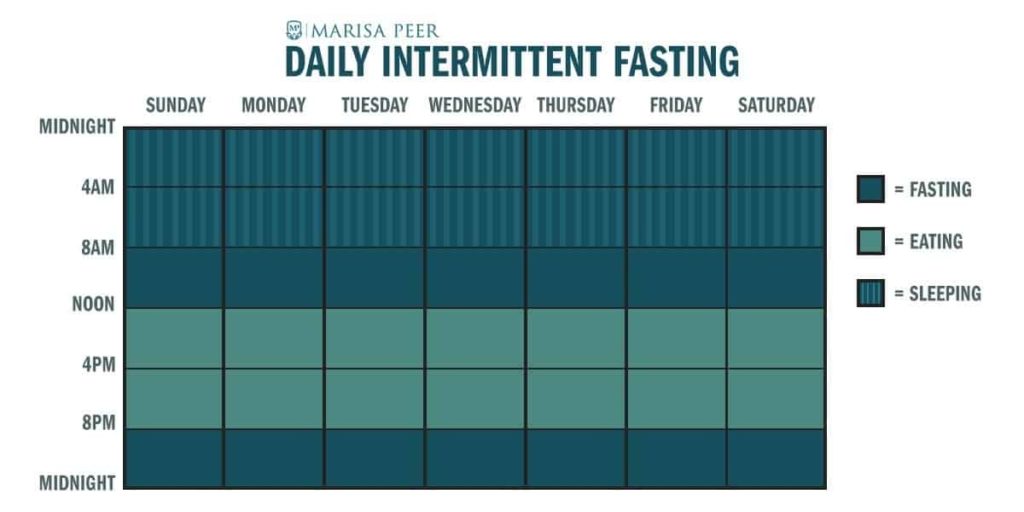
For example, if you start your 8-hour meal window at 12pm noon, you can eat meals up until 8pm. Many people choose to have 2-3 meals during that time, such as breaking the fast at 12, maybe a mid-afternoon snack and then a meal in the evening, finishing eating by 8pm.
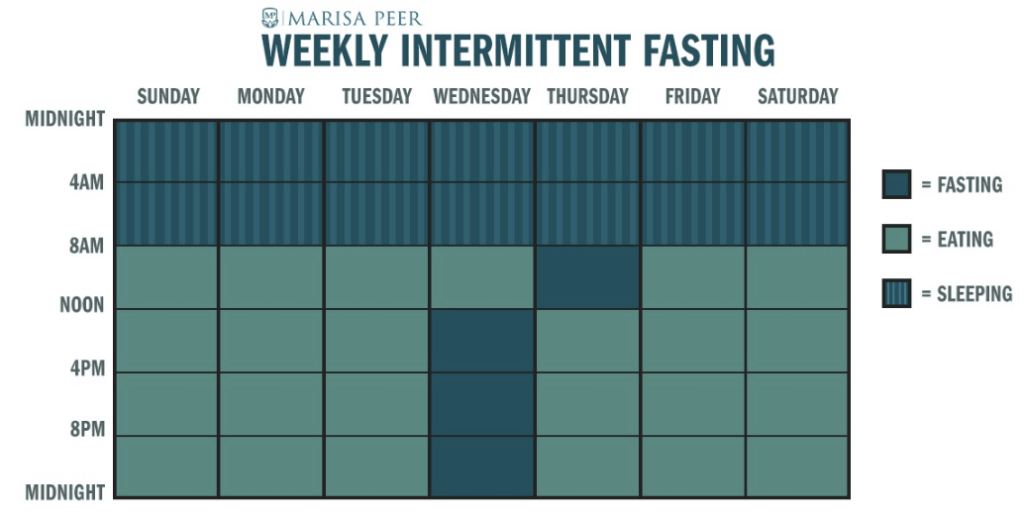
Weekly intermittent fasting
Even the occasional fast has shown benefits, which makes this a great place to start, even if it’s just once a month. You can fast from lunchtime one day to the next, as per the diagram below, giving you a 12-hour fasting window. You can increase this fasting window up to 24 hours.
This could be a good thing to do if you are looking for health benefits without the drastic weight loss. It also is a great way to test out the concept of fasting and to know it is possible.
Alternate Day Fasting (ADF)
As the name suggests, this eating plan involves alternating a ‘fast day’ with a normal ‘feed day’.
For example, in the graphic below we can see that you would eat as normal on Sunday and then fast after eating Sunday’s dinner until Monday’s dinner. Then you continue to alternate.
You can still have up to 25% of what you need on a fast day, so around 500 calories (cheers to that – with a green smoothie!)
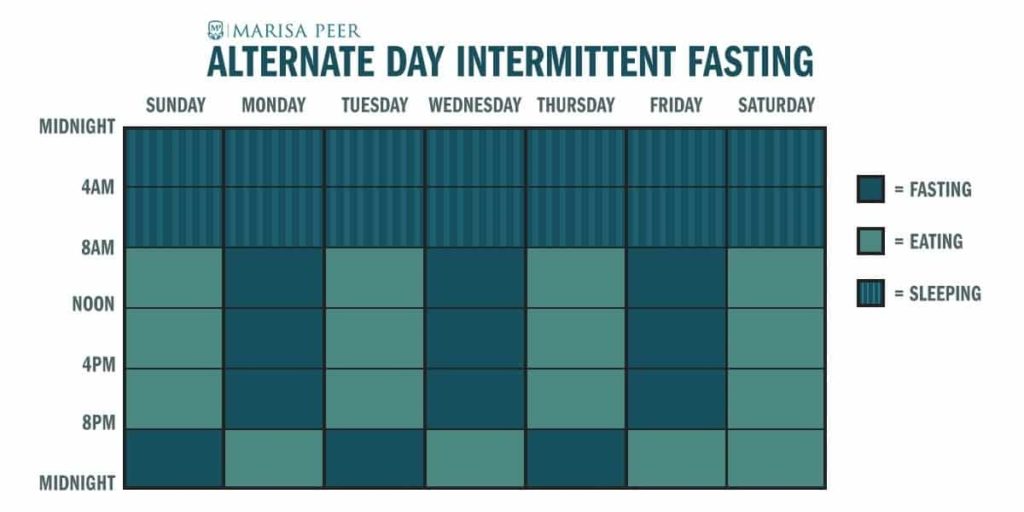
Eat Stop Eat
Nutritionist Brad Pilon developed his intermittent fasting variant, which he called ‘Eat Stop Eat’ as a way of fasting (limiting eating to only 400-600 calories) for 24 hours once or twice a week.
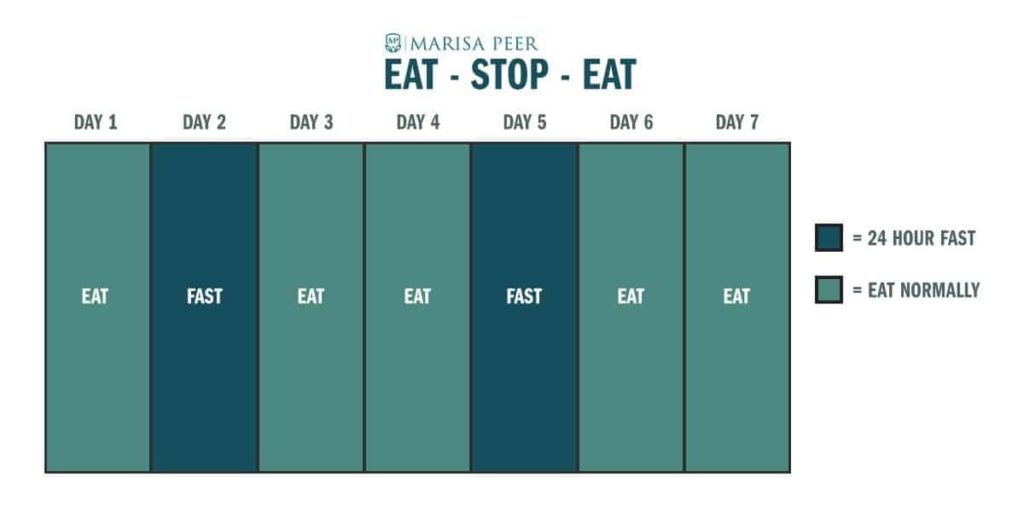
5:2 Fasting
This calorie restriction fasting diet was made famous with the Fast Diet and is similar to the idea of the Eat Stop Eat method.
In essence, the 5:2 plan involves eating normally for 5 days and fasting or restricting calories for 2 non-consecutive days each week.
On fasting days, it is recommended that women consume 500 calories and men 600 calories. This may equate to limiting your daily intake to two small very light meals, on two days of the week.
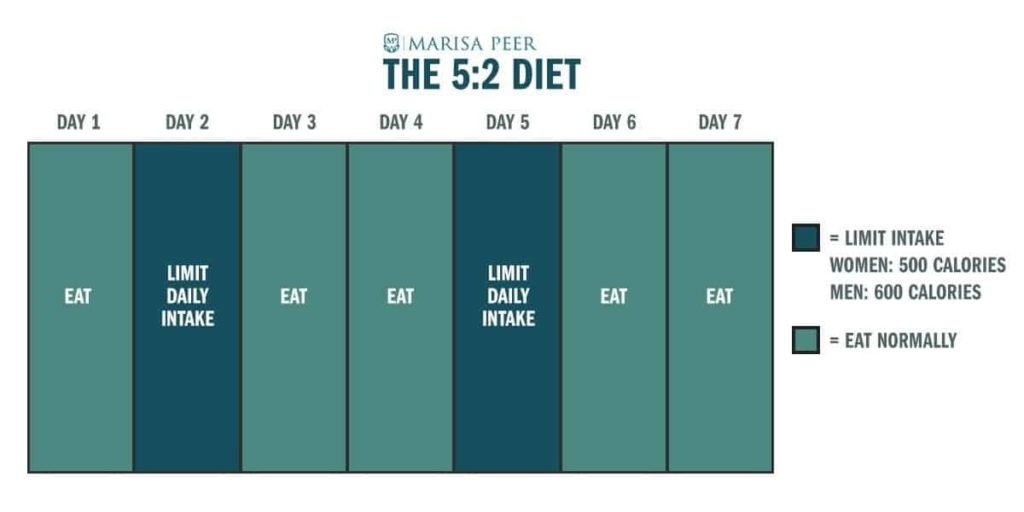
How much weight can you lose in a month with intermittent fasting?

It has been estimated that you will achieve a weight loss of one pound a week, if you are in a calorie deficit of 500 calories a day. Therefore, four weeks could result in losing four pounds. However, results can vary…
Typically an obese person will lose more weight. For example, Dr Krista Varady conducted a study which found that on average obese people lost 2-3 pounds a week, whilst healthy weight people only lost half a pound.
There are many incredible stories of successful intermittent fasting weight loss, depending on where people started and what kind of fasting they did. However, intermittent fasting is not for everyone and can require discipline and commitment to get into new habits.
Also, it might not be recommended for people who have had or are prone to eating disorders. If you do decide to try it, make sure that you try to eat healthy as well, as this will accelerate your progress and enhance the health benefits.

What is the best way of achieving your perfect weight?
Whilst there appear to be some great results being achieved with intermittent fasting and calorie-controlled diets, it is not for everyone. If you want to achieve fast but long-term results, it may be worth looking at the root of your eating patterns to identify ways to make healthier choices.
Celebrity therapist, Marisa Peer, famously worked on Supersize Skinny in the UK and US, after achieving phenomenal results helping people achieve their Perfect Weight Forever. She says that “The reason that most diets don’t work is that they focus on the wrong thing.
Many people eat for emotional reasons, when they are stressed, upset, lonely, or to fill a void they feel inside. No amount of dieting is ever going to change that. However, you can change how you feel and the thoughts and associations you have with food and that will change everything.”
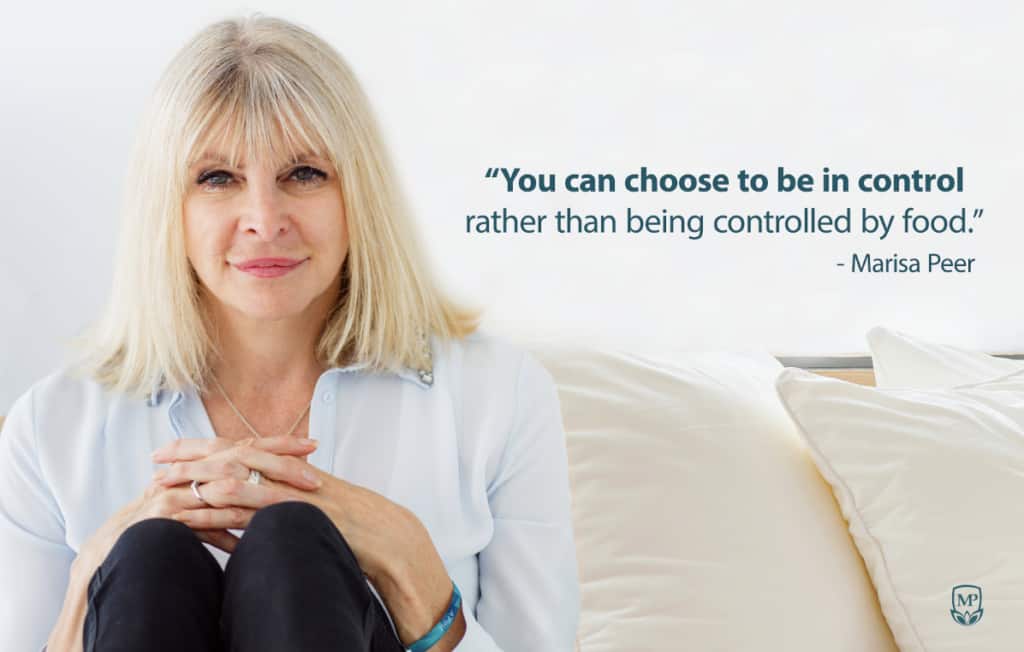
Marisa has designed her new 21-Day Healthy Living Challenge specifically to help people make healthier choices that nourish their body, and therefore their mind. With daily training, and an assortment of audios and meditations, Marisa will help you overcome your negative beliefs surrounding food and diets, and help you rewire your brain to create new habits that allow you to reach your goal weight, and maintain it.
Changing your eating habits is not enough, you must change your thoughts, beliefs, and words as well.
Learn how by clicking the banner below to find out more about the challenge, and secure your spot today.
Related articles:

